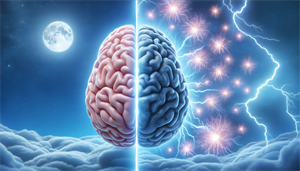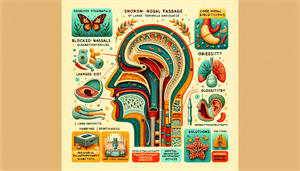
Have you ever wondered how a good night’s sleep can affect your life?
Or how a lack thereof can lead to major health problems, including memory loss and cognitive decline? The answer lies in a common but often overlooked sleep disorder known as sleep apnea and memory issues are often associated with it.
Key Takeaways
-
Sleep apnea, particularly central sleep apnea, leads to cognitive decline and memory loss due to oxygen deprivation and disrupted REM sleep, which can be mitigated with appropriate treatments like CPAP therapy.
-
Obstructive Sleep Apnea (OSA) is a common sleep disorder characterized by blocked upper airway, leading to breathing disruptions with signs including excessive daytime sleepiness and loud snoring, and is linked to serious health issues such as cardiovascular disease and diabetes.
-
Effective management of sleep apnea with treatments like CPAP therapy, oral appliances, lifestyle changes, or possibly surgery can improve memory function, cognitive performance, and overall health, reducing risks of high blood pressure, type 2 diabetes, and Alzheimer’s disease.
The Impact of Sleep Apnea on Cognitive Functions
Sleep apnea, especially central sleep apnea, significantly affects cognitive functions including memory, attention, and executive functioning. It’s not just about feeling groggy or unrefreshed in the morning. The effects of this sleep disorder reach far beyond fatigue, leading to cognitive decline and memory loss, especially when it remains untreated. But there’s a silver lining. Appropriate treatment, such as continuous positive airway pressure (CPAP) therapy, may help restore memory function to a degree.
The Role of Oxygen Deprivation
So, how does sleep apnea lead to cognitive decline? One of the key contributors is oxygen deprivation. When you have sleep apnea, your breathing repeatedly stops and starts during sleep, leading to periods of oxygen deprivation. This lack of oxygen to the brain is the primary cause of brain injury and memory loss associated with sleep apnea.
The effects of this oxygen deprivation aren’t just immediate; they have long-term consequences. Short-term effects include memory difficulties and impaired concentration. Long-term effects can lead to a reduced attention span, fatigue, daytime drowsiness, and challenges in cognitive functions such as reasoning and emotion regulation. Encouragingly, brain damage and memory loss can be reversed with effective treatment for sleep apnea.
Disrupted REM Sleep and Its Consequences
Disruption of REM sleep is another significant factor causing memory loss in sleep apnea patients. REM sleep is an essential part of our sleep cycle, playing a crucial role in memory consolidation. It helps to strengthen our declarative memory and allows memory traces to disengage from the hippocampus over time. Sleep apnea, however, disrupts this process, impacting the hippocampus’s signaling pathways, which are necessary for memory consolidation.
The long-term consequences of this disruption can be severe, leading to diminished academic performance, behavioral issues, and a decrease in overall quality of life, particularly in adolescents and children.
Daytime Drowsiness and Cognitive Performance
As if the memory issues and cognitive decline weren’t enough, sleep apnea also leads to severe daytime drowsiness and fatigue. This is a direct result of the lack of restorative sleep at night, owing to the frequent pauses in breathing.
Daytime drowsiness significantly impairs cognitive performance, leading to memory problems. This, in turn, affects daily functioning, mood, and quality of life, and can even result in reduced work productivity.


